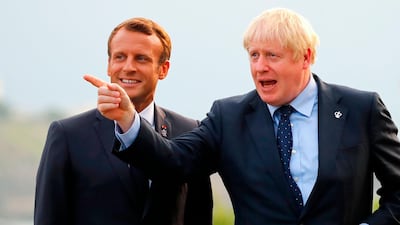Leaders of the Group of Seven wealthy nations will discuss global trade problems at their annual summit on Sunday, exposing a wide gap between US President Donald Trump and his western allies.
The G7 gathering is taking place as concerns grow about a global economic downturn and in an era of international disunity across issues that have strained decades-old allegiances.
Mr Trump joined the leaders from France, Britain, Japan, Germany, Italy and Canada in the French coastal resort of Biarritz for three days of talks that began on Saturday.
The talks have an ambitious agenda that includes the defence of democracy, gender equality, education and climate change.
The delegations had barely arrived before differences were exposed, with senior US officials accusing the host, French President Emmanuel Macron, of looking "to fracture the G7" by focusing on "niche issues" rather than major global concerns.
France denied this, pointing to Sunday's initial session covering the economy, trade and security, areas that used to draw easy consensus but are now sources of great friction.
Mr Trump arrived in France just hours after intensifying his trade war with China in a battle between the world's two largest economies that has unnerved financial markets.
"I am very worried about the way it's going, the growth of protectionism, of tariffs that we're seeing," British Prime Minister Boris Johnson said on Saturday.
"Those who support the tariffs are at risk of incurring the blame for the downturn in the global economy, irrespective of whether or not that is true."
Mr Trump also threatened France on the eve of the summit, saying the US would tax French wine "like they've never seen before" unless Paris dropped a digital tax on US technology companies.
European Council President Donald Tusk, who takes part in the G7 discussions, warned that the EU would respond "in kind" if Trump acted on his threat.
"This may be the last moment to restore our political community," Mr Tusk said on Saturday, giving a bleak assessment of western relations.
Looking to broaden the scope of the debate, Mr Macron has invited several African leaders to discuss the problems facing their continent.
And leaders from India, Australia, Chile and Spain were due to attend a dinner on Sunday where the focus would be on the environment, among other issues.
Mr Trump upended last year's G7 summit in Canada, walking out of the meeting early and dissociating himself from the final communique after endorsing it.
France has got around that problem by doing away with the time-honoured communique, deciding it was not worth even trying to find common language.
While the transatlantic rift is the most stark, there are also deep divisions within the European camp, with Mr Johnson making his debut at a time when he is struggling to persuade EU capitals to renegotiate Britain's divorce from the bloc.
Mr Johnson and Mr Tusk, who are due to talk on Sunday, sparred over who would take the blame if Britain left the EU on October 31 without a Brexit agreement acceptable to both sides.
"I still hope that PM Johnson will not like to go down in history as Mr No Deal," said Mr Tusk, who leads the political direction of the 28-nation EU.
Mr Johnson later said it would be Mr Tusk who would carry the mantle if Britain could not secure a new withdrawal agreement.
Mr Macron added to internal EU strains by unexpectedly threatening on Friday to block an EU trade deal with a group of South American states over Brazil's handling of fires that are ravaging the Amazon rainforest.
Germany and Britain both voiced deep concern about the blazes, but disagreed with Mr Macron on how to respond, saying shooting down the ambitious Mercosur trade accord would not help save the Amazon.

